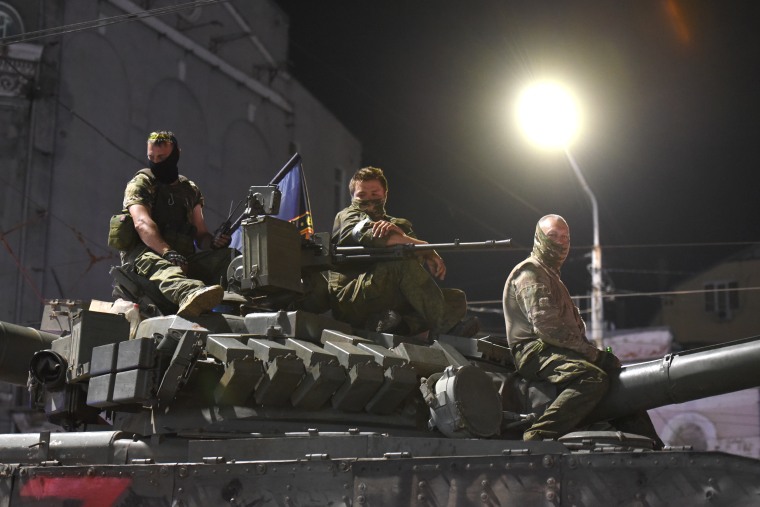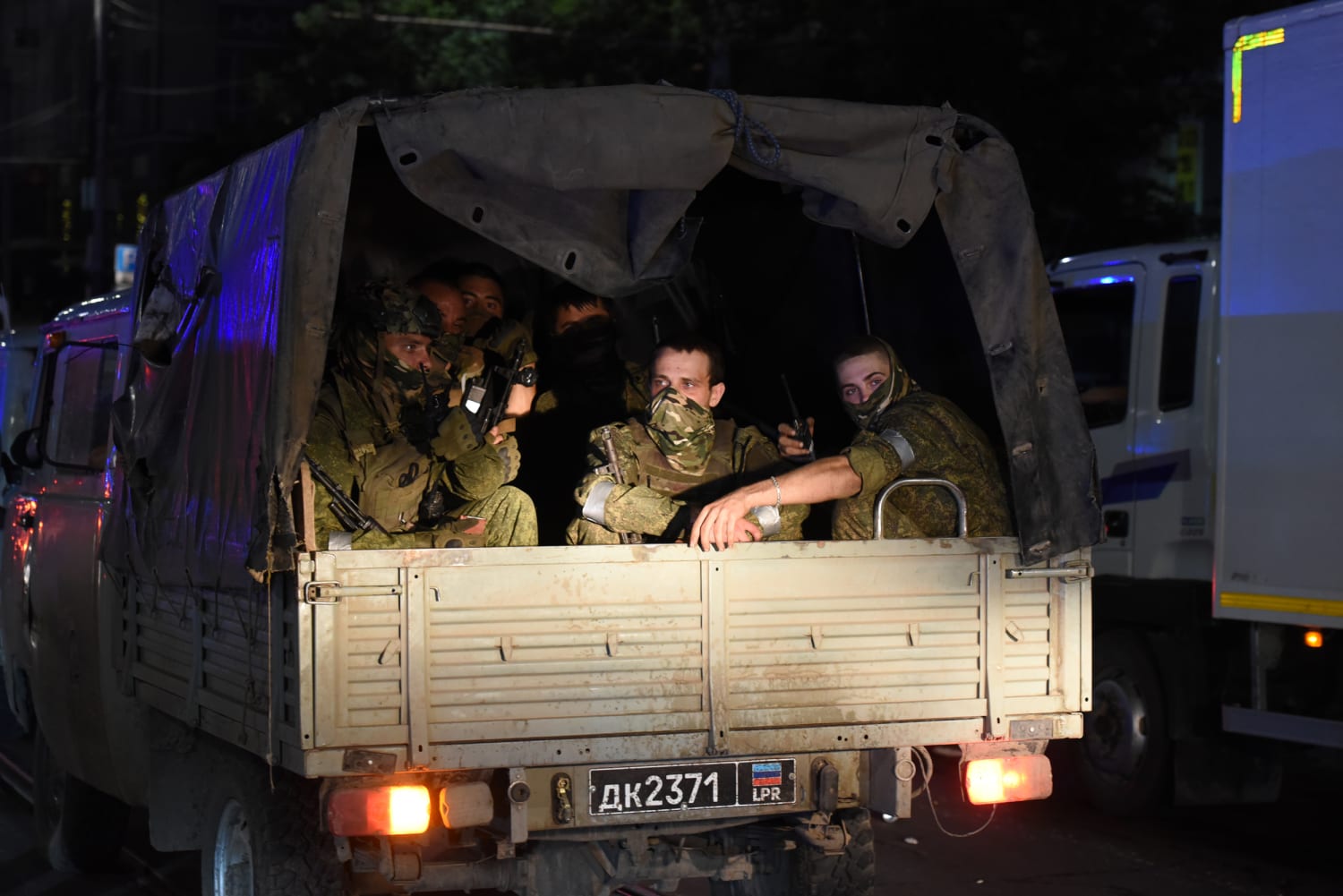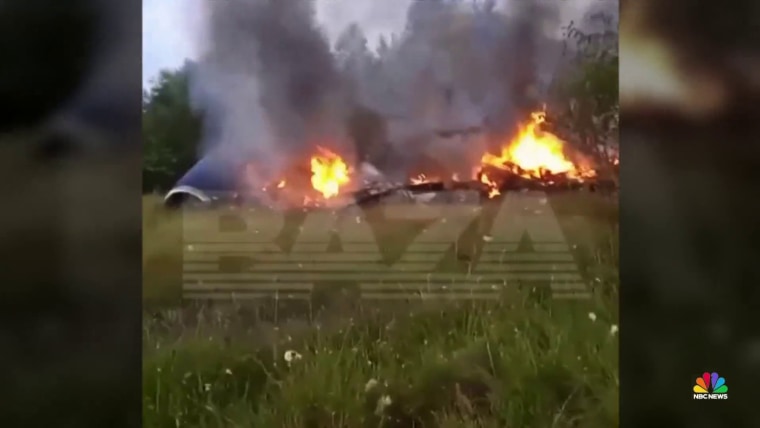This was a plane crash felt far beyond the fields north of Moscow.
The fiery demise of a jet believed to be carrying Russian mercenary chief Yevgeny Prigozhin and some of his lieutenants will have sent ripples through the global web of financial and military entanglements the former caterer had built from his Kremlin connections.
Their presumed deaths leave uncertain the future of the Wagner Group — Prigozhin’s powerful, battle-hardened mercenary force — along with its often brutal and destabilizing presence in Eastern Europe, the Middle East and across Africa.
“There is a leadership vacuum in Wagner. That was likely the intention,” Mark Cancian, a retired colonel in the U.S. Marines and senior adviser at Washington-based think tank the Center for Strategic and International Studies, told NBC News.
Alongside Prigozhin, Wagner commander Dmitry Utkin — a shadowy figure with neo-Nazi tattoos known as the mercenary chief’s right-hand man — and logistics chief Valery Chekalov were also on board the plane when it went down Wednesday, according to Russian authorities.
“That makes it much easier for the Kremlin and Russia’s military leaders “to control what happens next,” Cancian said.
‘Sad’ in the Central African Republic
Fidele Gouandjika was, at least briefly, in mourning.
An adviser to the leader of the Central African Republic shared a post on Facebook on Thursday tagging himself as “feeling sad” with a photo of him saluting, alongside an image of the wreckage of Prigozhin’s jet.
He praised Wagner for “saving Central African democracy” with an intervention that Western diplomats told NBC News had left the country effectively controlled by the mercenary group.
But President Faustin Archange Touadéra’s spokesman, Albert Mokpeme, said by phone Friday that Prigozhin’s possible death “doesn’t change anything for us.” His boss already deals directly with the Russian authorities, and that fruitful relationship was not about to be derailed, he said.
“You can call them Wagner or whatever you want, but it works,” said Mokpeme, speaking from the BRICS summit of developing nations in South Africa, where Russia and China have been working to expand the bloc’s reach as a counter to the United States.
The Kremlin’s bid to extend Russian influence abroad has long had Wagner at its heart, making the group’s fate in Africa and beyond all the more crucial.
Prigozhin and his mercenaries have supported strongmen on the continent and earned riches on the back of it, with the group accused of exploiting gold and diamond mines in some African countries in return for military support.
Wagner’s focus on Africa appeared as solid as ever before the plane crash, with Prigozhin appearing in a video in which he hinted that he was in Africa, conducting reconnaissance and “making Russia even greater on every continent.”
Prigozhin visited Mali and CAR only days before his apparent death, meeting with government officials and looking for new opportunities, according to J. Peter Pham, the former U.S. envoy to the Sahel region of Africa and a longtime analyst of the region.
“Having lost much in Russia … it seems that Prigozhin was in Africa to look after and reassure not only his remaining clients — the Central African Republic regime of Faustin-Ange Touadéra, the RSF in Sudan, and the Malian junta — but also his mercenaries,” Pham said, referring to the Rapid Support Forces currently fighting Sudan’s military.
Even with Prigozhin out of the picture, “the opportunities that he seized upon to both undermine Western geopolitical interests — and profit while doing so — remain intact,” Pham added.
The Wall Street Journal first reported on Prigozhin’s recent visit to the region.
Nathalia Dukhan, an investigator with The Sentry, a research and advocacy group that has tracked Wagner’s activities across the continent, said her organization obtained information indicating that in his recent trip to CAR, Prigozhin visited mining sites and “also sought to obtain new contracts to control the country’s vast borders as well as attract potential investors in multiple economic sectors, including oil.”
The visit coincided with social media posts about the opening of an investment center at the Russian House, an organization registered in CAR and affiliated with the Wagner outfit, that is supposed to offer free business services to attract Russian investors, according to Dukhan.
Prigozhin’s “apparent aim was to reassure Touadéra of Wagner’s commitment in CAR, to further scale up and accelerate profiteering activities, and lock in the Russia-CAR enterprise for the long term — In short, a 21st century-style colonization,” she said.
NBC News could not independently confirm whether Prigozhin had looked to secure new contracts for border security operations or other commercial ventures.
Russian President Vladimir Putin also acknowledged Prigozhin’s work in Africa during his eulogy for the mercenary chief Thursday, calling him a “talented businessman” who had “dealt with oil, gas, precious metals and gems.”
Former U.S. officials and analysts said they also did not expect a major change in Wagner’s presence in Africa and the Middle East, including in CAR, Mali, Burkina Faso, Sudan, Syria and Libya. The outfit’s security contracts, mining operations and smuggling schemes likely will continue, albeit under more pliant management, as the Kremlin has seen Wagner’s presence as a useful tool to boost Moscow’s influence, they said.
Wagner’s operations in Africa have been lucrative and effective for Moscow, providing “a low cost investment for relatively high impact — a lot of rubble for the ruble,” said Paul Kolbe, a former CIA officer and now senior fellow at Harvard University’ Belfer Center.
“The purpose, the main goals and main mechanisms that Russia had for Wagner and the capability remain the same,” said Kolbe, who served 25 years in the CIA with overseas assignments in the former Soviet Union, southern Africa and elsewhere. “So they’ll figure out a way to do it.”
Russia also appeared to signal it remains committed to Wagner’s role in Libya, with Russian Deputy Defense Minister Yunus-Bek Yevkurov paying a visit to the country Tuesday and meeting Libyan commander Khalifa Haftar. Flouting an international arms embargo, Wagner paramilitaries have armed and backed Haftar, whose faction has waged a campaign against the U.N.-recognized government in Tripoli.
There was no indication Wagner’s operations would be scaled back in Libya, and though its leadership and activities might be reorganized, the effort will “have to obey the same logic, which is to have a semi-private company that will operate on a clandestine basis,” said Jalel Harchaoui, an associate fellow at the London-based Royal United Services Institute think tank.
Ukraine and Belarus
But it may not be an entirely smooth transition for the Kremlin.
“The demise of Prigozhin would almost certainly have a deeply destabilizing effect on the Wagner Group,” British military intelligence said in its assessment Friday.
Prigozhin’s drive and extreme brutality permeated Wagner, the assessment said, and “are unlikely to be matched by any successor.”
After Prigozhin’s short-lived mutiny against the country’s military leadership two months ago, it was already clear the Russian Defense Ministry had the intention of absorbing the mercenary force, allowing mutinous fighters to sign contracts with the regular military as part of a deal that also allowed Prigozhin and his fighters to go into exile in neighboring Belarus.
Months of bad blood between the mercenaries and Moscow’s military leaders could mean that a lot of Wagner fighters would rather be commanded by anyone but Defense Minister Sergei Shoigu.
Chechen leader Ramzan Kadyrov could be the man for the job. He said earlier this year he wanted to create his own mercenary force in the style of Wagner. Kadyrov lamented Prigozhin’s loss and “iron character” in a statement on Telegram on Thursday, one of the few top Russian officials to speak out after the crash, but called him out for putting personal interests ahead of “matters of paramount national importance.” Unlike Prigozhin, Kadyrov has maintained absolute loyalty to Putin.
There are also questions about the fate of Wagner fighters who went into exile in Belarus, where their presence close to NATO’s eastern borders has put U.S. allies on high alert. But it’s unclear how many fighters are still stationed there, and who could assume command over them.
The number of Wagner mercenaries in the country had been gradually decreasing even before Wednesday’s plane crash, with the majority going back to Russia, Andrii Demchenko, a spokesman for Ukraine’s State Border Service, said Friday.
But President Alexander Lukashenko insisted that Wagner was alive and well in Belarus. While some fighters were leaving, the “core” of the group remained, the country’s state media agency Belta reported him as saying Friday. He said he could call up to 10,000 fighters back within days, if needed.

Could the plane crash have a direct impact on the war in Ukraine, where Wagner units led a monthslong bloody battle for the town of Bakhmut to deliver a small but symbolic victory that helped elevate Prigozhin’s status?
Their “heroism” in Ukraine will not be forgotten, Kremlin spokesman Dmitry Peskov said Friday, while skirting questions about Wagner’s future.
With the Russian army trying to hold off Ukraine’s new counteroffensive, Moscow is desperate for reinforcements and may be eager to add most of the Wagner personnel into the armed forces, analysts said.
The most likely outcome is that Wagner will splinter into two, with the remaining leaderless groupings in Belarus disbanded, and the other faction active abroad morphing into something else that can be a tool of Russian foreign policy, according to Emily Ferris with the Royal United Services Institute.
“The Kremlin will have likely learned its lesson that personalities like Prigozhin with their own dangerous ambitions are a wild card, and any new leader would likely be someone handpicked by the Kremlin,” she added.
Source: | This article originally belongs to Nbcnews.com









